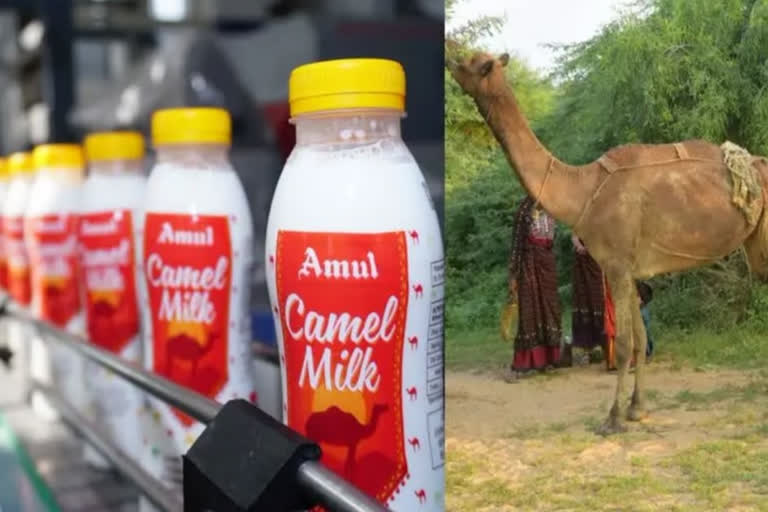Kutchh (Gujarat): Asia's first deodorized camel milk processing plant has become operational at Chandrani village, Kutch, Gujarat. With this, the incomes and living conditions of camel maldharis (herdsmen) have improved. They used to get just Rs 20 per litre camel milk but now it has gone up to Rs 51 per litre. As a result, camel rearing has become a source of reliable income and no longer a hobby.
With Amul's Kutch plant promising to show greater prospects, camel herders are also increasing in number nowadays. There are just three centers in the world for processing camel milk in Dubaim and Pakistan. The fourth one with an ultra-modern processing machine is started at Chandrani village in Anjar taluk of Kutch.
Sarhad Dairy's Chairman Valamjibhai Honbal said that at present the market of camel milk is well established in Kutch district. Camel milk is being collected at 5 places in the district including Sarhad Dairy, Amul, Sahjeevan and Kutchh Ulhak Maldhari Sangathan Managing societies.
Daily, 3,500 to 4,100 liters of milk is collected. The price of a camel went up from Rs 10,000 earlier to Rs 35,000 to Rs 40,000. Nowadays youth from Jamnagar, Patan, Banaskantha are buying camels. Camel milk, rich in dietary minerals, helps in improving the health and increases immunity.
Also Read: Coimbatore man starts Camel milk farm to boost immunity in Tamil Nadu
In the Kutch camel milk plant, they have removed odour from milk. Milk production and packaging plant of Sarhad Dairy at Chandrani village of Anjar taluk started functioning from January 2023. Built at a cost of more than Rs 180 crore, this plant is expected to taste success the odor in camel milk will be removed with the help of a 'deodorization' machine.
Many benefits of this milk have also been mentioned in the books of Ayurveda, which has been used for thousands of years in different cultures. Camel milk contains insulin-like protein, which manages blood sugar levels. Camel milk powder helps in management as well as prevention of diabetes. As awareness increases, so does the demand for camel milk products.
Ice cream and chocolate will also be prepared. Sarhad Dairy's Chairman Valamjibhai Hanbal said that theirs is the number one plant in India when it comes to camel milk. Earlier camel milk sold at just Rs 20 per litre but today they are getting Rs 51 per litre. The dairy provides livelihood to 200 to 300 families. Old camel herders are also returning to camel rearing.
Kutch is one of those districts that have more livestock than human population. There are about 20 lakh livestock in Kutch of which more than 13,000 are camels. Breeders in Kutchh used to keep camels only as a hobby. But ever since the market for camel milk has increased, herders have also taken interest in camel rearing. Today the price of camel has also increased along with production of camel milk.
Many maldharis (herdsmen) in Kutch rear cows, buffaloes, sheep, goats, horses, camels and donkeys. Horses and camels were kept by herdsmen only as a hobby. Presently two types of camels are seen - Kutch and Kharai camels. Of the 13,300, nearly 1,600 are Kharai camels. The Kharai camel is reared by the Fakirani Jat community and it swims in the sea and eats cheriya on bats. If Cheria becomes extinct then the Kharai camel breed will become extinct. This is the only camel in the world that can swim.



